Technology brought many new things to the business world and revolutionized many aspects of it. Working remotely was one of the things that shaped modern businesses. The ability to take your work with you wherever you go was unimaginable during the early industry days.
During the pandemic of COVID-19, many companies survived by sending their workers to work from home. After they saw that hasn’t disrupted productivity, they allow them to continue working remotely if that was their wish.
Remote work, or working from home, can offer several benefits to both employees and employers. For businesses, it reduces costs by eliminating expensive office expenditures while allowing you to stay in touch online. Also, business owners can now employ skillful people from distant places. Employees now have improved work-life balance that makes them more productive.
We were intrigued by the rise of people who like to work from out of the office, so we researched the data to find out which European countries offer the most benefits for remote workers and what are the countries with most remote workers.

Methodology
This survey was conducted on the sample of 20 most populous EU countries, which were compared by 10 ranking factors to find out which best meets the demands of remote workers in 2019. The factors used in this research are (sources for them are given at the end of this article):
- Percentage of people currently in remote work
- Number of co-working spaces
- Number of coffee shops
- The average price of coffee
- Number of Wi-Fi hotspots
- Internet security score
- EU Commission Transport score
- Happiness Index score
- Rent Index score
- Cost of living
The score for every factor was presented as a percentage and assigned to countries from the list. We concluded that these are the top 10 countries for remote workers in the EU. Be aware that this is not the list of countries with most remote workers but the ones that offer the most for them.
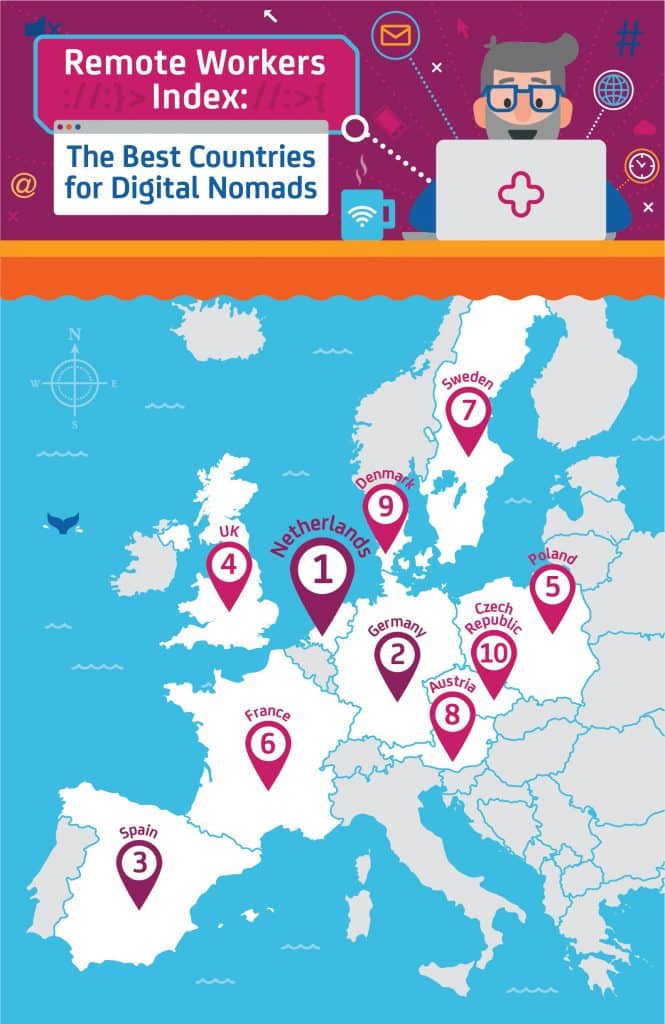
1ST: NETHERLANDS

Image source: Pixabay
Top 3 Positions:
Number of people in remote work: 13.7% (1st overall)
EU Commission Transport Score: 1 (1st)
Internet Security Score: 11% (2nd)
Overall score: 682
With the highest rate of people in remote work, the Netherlands is leading the way for digital nomads. Our other statistical parameters are showing why Dutch like to work remotely. They are 3rd in total Wi-Fi hotspots meaning that they can easily connect to the internet from every part of the country, and by their overall happiness index, they are also in 3rd place.
Combining that with the third largest amount of coffee shops, it is obvious why people who live in the Netherlands like to work remotely.
If you are intrigued by these numbers and would like to try your luck working in the Netherlands, keep in mind that living in this country is very expensive. The Netherlands came second last on the Rent Index (scoring 34.74) and the Cost of Living (74.83), so you would need a very competitive salary if you decide to move there.
2ND: GERMANY

Image source: Freepik
Top 3 Positions:
Number of Wi-Fi hotspots: 36,890,223 (1st)
Number of co-working spaces: 418 (3rd)
EU Commission Transport Score: 3 (3rd)
Overall score: 651
When we are talking about countries with most remote workers, Germany has more workers than the Netherlands, speaking in absolutes. This research showed why is that. Germany makes an excellent place for remote workers because of many Wi-Fi hotspots and co-working spaces that enable them to work from almost every point of the country.
Germany only came outside the top ten for three factors, and that’s down to a barrier you could face in the Netherlands, it’s expensive: average price of coffee (11th), the Cost of Living (11th), and Rent Index score (15th). But you can avoid most of that by renting your place in the countryside, outside big cities.
3RD: SPAIN
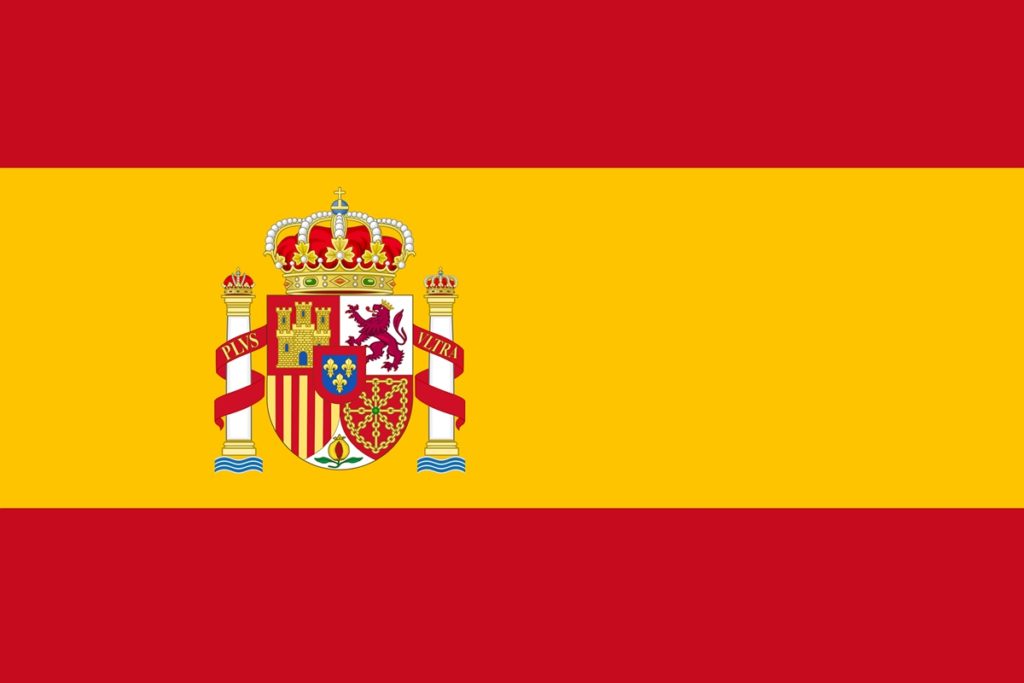
Image source: Pixabay
Top 3 Positions:
Number of co-working spaces: 778 (1st)
The average price of coffee: £2.90 (4th)
EU Commission Transport score: 5 (5th)
Overall score: 619
The last country on this improvised podium in Spain. With a strong performance on transport, solid coffee prices, and the most co-working spaces around, you’re in a good place to grab a morning coffee and catch the bus to your favorite spot to work.
The country also scores well for Wi-Fi hotspots (6th), Rent Index (8th), and Cost of Living (8th). The biggest disadvantage of being a remote worker in Spain is problems with internet security. Over 30% of internet users reported security issues, which places Spain in 16th place in that category.
4TH: UNITED KINGDOM

Image source: Public Domain Pictures
Top 3 Positions:
Number of coffee shops: 12.3 (1st)
Cost of living: 660 (2nd)
Number of Wi-Fi hotspots: 32,667,355 (2nd)
Overall score: 598
The first country out of the top 3, and with only two points short of a score of 600, is the UK. One of the findings of this study is that the United Kingdom meets most of the demands a remote worker has to be efficient and productive. The UK also has the 2nd most co-working spaces and reasonably secure internet infrastructure (8th).
Although the UK has high scores in many important factors, only 4% of the UK workforce works remotely. The reason behind this is the very high prices of rent (17th) and the cost of living. The prices of coffee are also among the highest in the EU (17th place of 20 countries included in this research).
5TH: POLAND
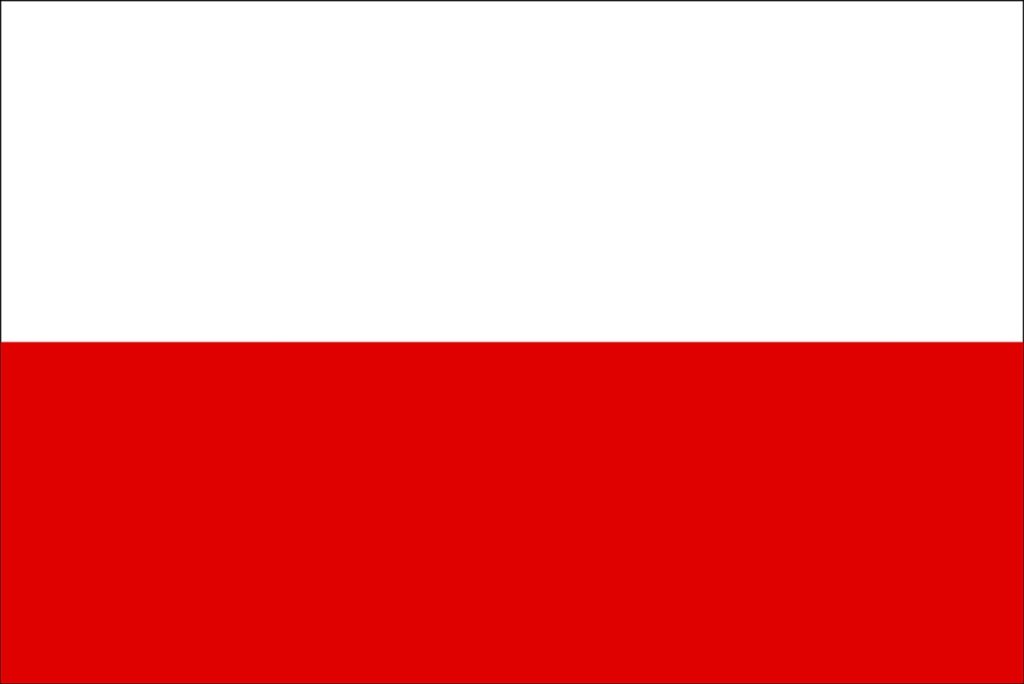
Image source: Pixabay
Top 3 Positions:
The average price of coffee: £2.61 (2nd)
Cost of Living: 39.13 (3rd)
Rent index score: 14.92 (5th)
Overall score: 580
The first country from Eastern Europe that appeared on our list is Poland. As expected, the main advantages of working remotely in Poland are low prices. Poland’s Cost of Living, Rent Index, and coffee prices are particularly strong.
The areas where Poland is struggling are their transport score and the overall happiness of their citizens. 16 of the countries in the study have more efficient transport systems, while those living in Poland are the 14th happiest out of the 20 countries.
6TH: FRANCE

Image source: Public Domain Pictures
Top 3 Positions:
The average price of coffee: £2.57 (1st)
Co-working spaces: 294 (4th)
Number of Wi-Fi hotspots: 10,055,930 (4th)
Surprisingly, France is ranked 6th in this research. But when looking closely at the results gotten from the analyzed data, it is much clearer why is that. France is also placed fifth for the EU Commission transport score (6), and sixth for the percentage of people in remote work (6.8%).
Two factors are preventing France to be a more desirable place for digital nomads. A third of internet users were affected by security issues in 2015, placing them 17th on the internet safety ranking. But that’s not as bad as their Cost of Living score. At 74.85, France comes to rock bottom for this factor, making it the most expensive place to live in Europe for remote workers.
7TH: SWEDEN

Image source: Creazilla
Top 3 Positions:
The average price of coffee: £2.70 (3rd)
EU Commission Transport score: 3 (3rd)
Happiness Index: 7.315 (4th)
The first Scandinavian country on our list is Sweden, and as expected, it scored well for all things characteristic of Scandinavian countries. As well as happy citizens and an excellent transport system, Sweden also comes in the top eight for the percentage of people in remote work (8th) and the number of Wi-Fi hotspots (9th).
Two things that push them down the list are the Cost of Living (13th) and the number of coffee shops (16th). Those are only two parameters unfavorable for remote workers (we won’t mention cold right now).
8TH: AUSTRIA
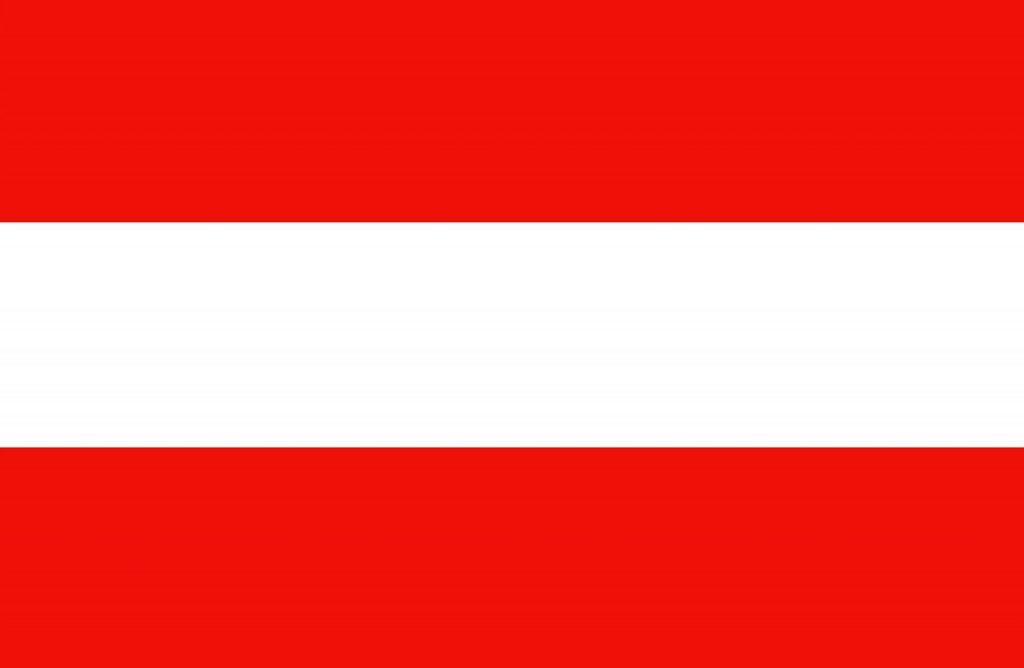
Image source: Public Domain Pictures
Top 3 Positions:
Percentage of people in remote work: 9.5% (3rd)
Happiness Index: 7.139 (5th)
Number of coffee shops: 2 (6th)
Overall score: 534
Although Vienna is voted as the best city in the world to live in, Austria is only in the 8th place of most desirable countries for a remote worker in the EU. The Austrians score particularly well for the safety of their internet (19% of affected users placed them 7th) and transport links (8th best-placed country in the EU Commission’s report).
But when we see the costs of living in Austria, we get a clearer picture. Austria is one of the more expensive EU places to live, evidenced by their 14th position on the Cost of Living scale and 16th place on the Rent Index.
9TH: DENMARK
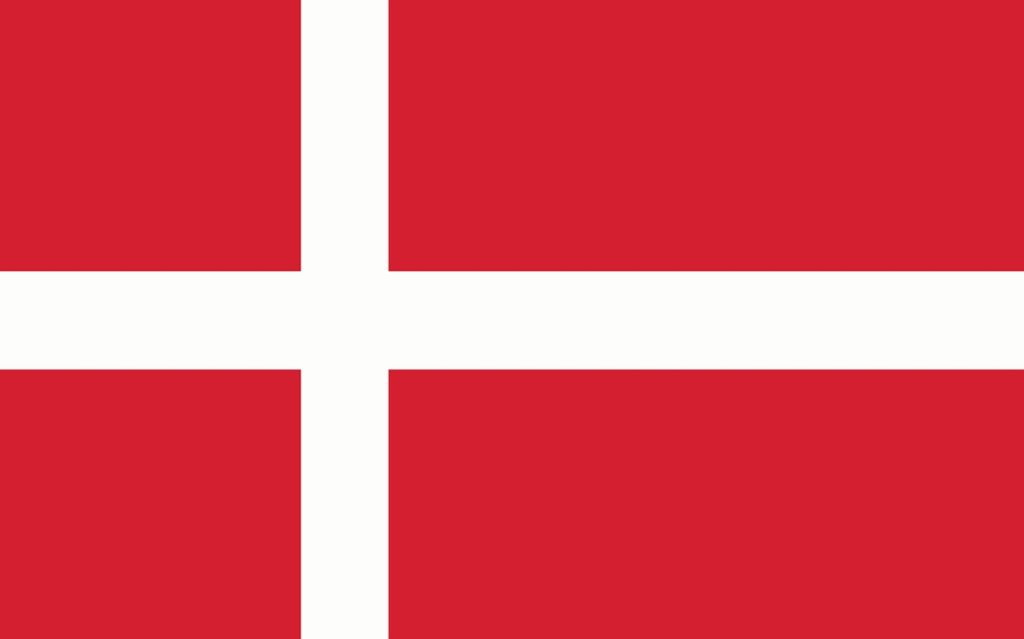
Image source: Pixabay
Top 3 Positions:
Happiness Index: 7.555 (2nd)
Percentage of people in remote work: 8.6% (4th)
EU Commission Transport score: 6 (5th)
Overall score: 509
Denmark is the second Scandinavian country on this list of countries with most remote workers. Once again, a Nordic country scores high on the happiness of its people and its transport infrastructure. On top of that, the Danes are already on board with remote work, with only three countries having a higher percentage of out-of-office workers.
The main problem of Denmark is the lack of co-working spaces (52 spaces puts them in 16th place for this factor). As expected, Denmark is a very expensive country to live in. It is ranked 18th on the Cost of Living and Rent Index means Denmark can do no better than 9th.
10TH: CZECH REPUBLIC
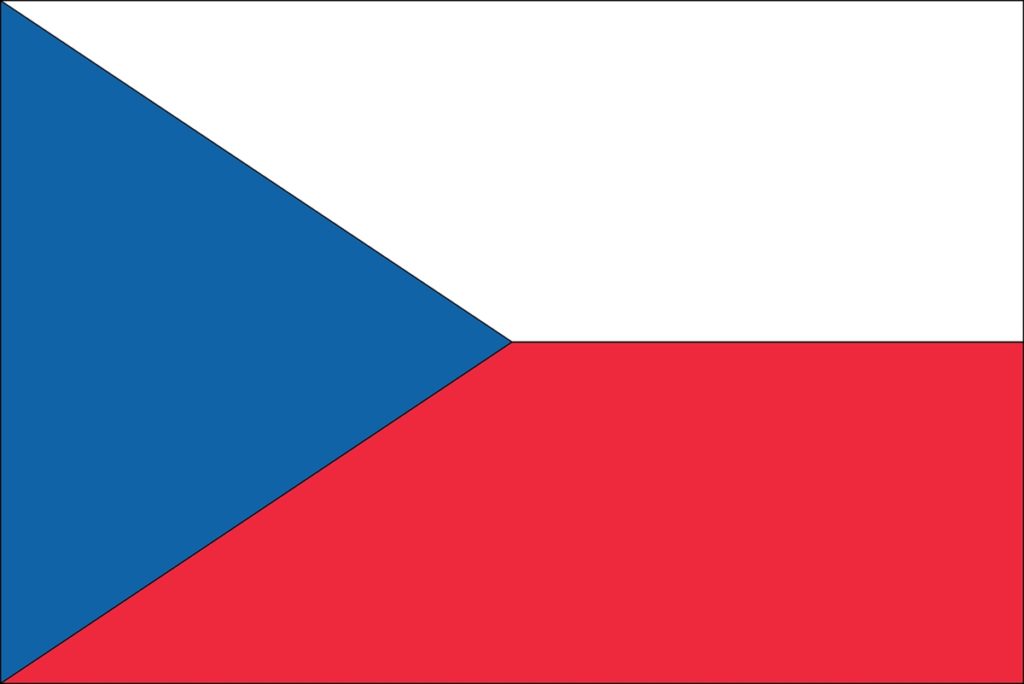
Image source: Pixabay
Top 3 Positions:
Internet Security Score: 10% (1st)
Cost of Living: 45.12 (6th)
Rent index: 18.27 (7th)
Overall score: 477
You didn’t expect two Easter Europe countries appear on the list of countries with most remote workers, don’t you? Well, the Czech Republic has one main advantage compared to all other countries on this list. They have the best internet safety score of the entire study.
On the other hand, Czech hasn’t ranked in the top five for any other factor. However, it has plenty of middle-ground factors – helping it to rise into the top ten. It’s placed well for the number of coffee shops (9th), the number of Wi-Fi hotspots (10th), and the Happiness Index (10th).
Countries with Most Remote Workers: Final Words
The number of remote workers will continue to rise in the coming years, and if you already didn’t consider that possibility, this is the right time to see what you can do about it.
Remote work eliminates many stressors and allows employees to focus on their work without distractions. It also offers employees greater autonomy and flexibility, which can lead to higher job satisfaction.
But the best part is that you, as a worker, will have more time for family and friends and the quality of your life will improve.
If you are intrigued with all we wrote here, check out job openings in the countries we presented and see if anything aligns with your interests and expertise.
Data Sources
- Percentage of people currently in remote work – Data from 2017 (source)
- Number of co-working spaces – Coworker.com (source)
- Number of coffee shops – Starbucks per 1 million inhabitants 2015 (source)
- The average price of coffee – Average retail price per pound 2017 (source)
- Number of Wi-Fi hotspots – (source)
- Internet security score – Internet users affected by security issues 2015 (source)
- EU Commission Transport score 2019 – (score)
- Happiness Index score – 2018 World Happiness Report (source)
- Rent Index score – 2019 Cost of Living Study (source)
- Cost of living – 2019 Cost of Living Study (source)
